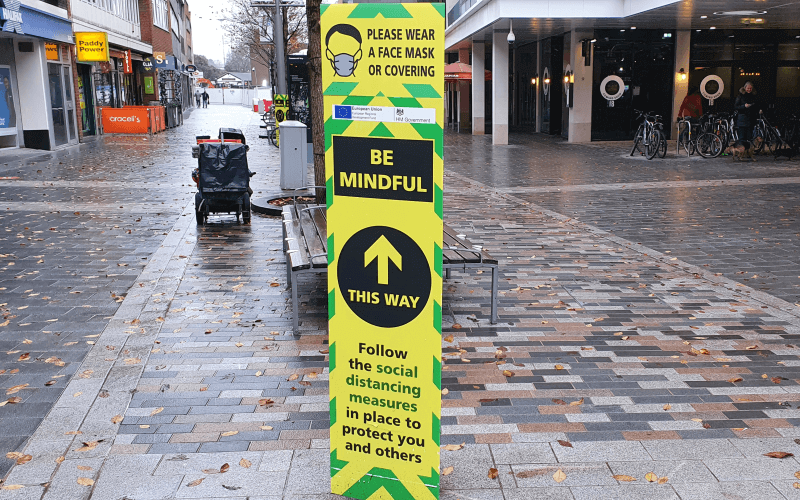Employers have frequently failed to take action to protect disabled workers who were at particular risk from coronavirus during the pandemic, according to the “frightening” results of a new survey carried out on behalf of the TUC.
Of those disabled workers who discussed the extra risks they faced with their employer – including many who were supposed to be shielding from COVID-19 – one in four said their boss had taken only some of the action possible.
And seven per cent of those disabled workers who discussed their health and safety concerns said their employers had taken no action at all.
The survey of more than 2,000 disabled workers – carried out by YouGov for the TUC – also found that more than one in five of those who had been advised to shield continued to work outside their home during the pandemic at least some of the time.
All workers who were advised to shield and could not work from home should have been furloughed to protect their health, says a report based on the survey (PDF).
It adds: “They should not have had to choose between their livelihoods or their health.”
The TUC report describes how disabled workers raised concerns with their unions about the actions of their employers during the pandemic.
Some employers pressured workers who had been advised to shield to return to work outside of their homes.
Others placed disabled workers on furlough instead of making the reasonable adjustments that would have enabled them to work from home.
The survey also found that nearly one in three disabled workers (30 per cent) said they had been subjected to unfair treatment since the start of the pandemic.
One in eight said they had been bullied or harassed at work; seven per cent were questioned about their commitment to their job; and four per cent said they were given harder or less popular tasks compared to colleagues in similar positions.
The survey also showed that many disabled workers continued to struggle to secure the reasonable adjustments they needed during the pandemic.
Of those who had a need for reasonable adjustments, only 56 per cent of those who asked for reasonable adjustments said they were implemented in full by their employer before the pandemic.
About the same proportion – 55 per cent – said they had asked for additional or different reasonable adjustments during the pandemic which had been fully implemented.
Ann Galpin, co-chair of the TUC’s disabled workers’ committee, and chair of the National Union of Journalists’ disabled members’ council, said the polling “exposes what is already well known to disabled workers: many employers de-prioritise us and see our requests for reasonable adjustments as an inconvenience”.
She said that reasonable adjustments were a “vital tool to ensure disabled workers’ full and safe participation at work.
“That some employers managed to treat their disabled workers pretty well during the pandemic shows that it is possible – and that it makes economic sense too.”
She added: “The findings mirror what we are hearing in our trade union health and safety briefings too.
“Employers’ failures to review or implement reasonable adjustments, together with lack of insight into how to support disabled workers or address the impact of Long Covid, are recurring issues.”
Other issues have included rising workloads and the failure of employers to recognise their duty of care to their staff, she said.
Galpin said the TUC was calling on the Equality and Human Rights Commission to update its employment code of practice and carry out targeted enforcement action around reasonable adjustments.
Dave Allan, the disabled members’ representative on the TUC’s general council, and Galpin’s co-chair on the disabled workers’ committee, said the report’s findings were “frightening”.
He said: “The pandemic has brought to the foreground many of the issues facing disabled workers and disabled people.
“We have seen disabled workers step up and support our employers in less then ideal circumstances.
“We have continued to work from home, something we had been told for years was not possible, without the reasonable adjustments we needed.
“However, it is now more than a year on since the first lockdown and many disabled workers are still working from home without the adjustments we need.
“We have heard that a year on some disabled workers are still working off of ironing boards, or without specialist software they require.
“This is not acceptable.”
He added: “Workplace protections under the Equality Act have not changed under the pandemic, employers need to meet their legal duties and put in place the adjustments workers need to do their job.
“Our members should not dread going into work because they believe they are being set up to fail.”
A note from the editor:
Please consider making a voluntary financial contribution to support the work of DNS and allow it to continue producing independent, carefully-researched news stories that focus on the lives and rights of disabled people and their user-led organisations.
Please do not contribute if you cannot afford to do so, and please note that DNS is not a charity. It is run and owned by disabled journalist John Pring and has been from its launch in April 2009.
Thank you for anything you can do to support the work of DNS…

 Minister agrees to cross-party talks on strengthening rights for disabled renters
Minister agrees to cross-party talks on strengthening rights for disabled renters Mirror backs columnist who claimed ‘millions’ of disabled people were wrongly claiming benefits
Mirror backs columnist who claimed ‘millions’ of disabled people were wrongly claiming benefits Seven supermarket chains have introduced inaccessible fridges in their stores, say disabled shoppers
Seven supermarket chains have introduced inaccessible fridges in their stores, say disabled shoppers